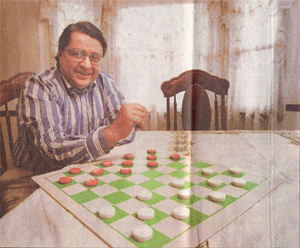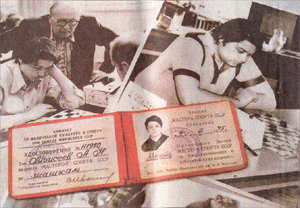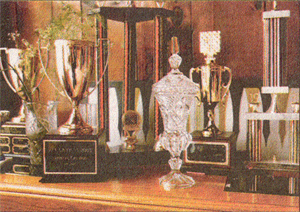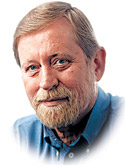
World Champion Alex Moiseyev
Central Ohio has connections to two of the six World Checker Champions.
Standing at the corner of Broad and High, offer a fistful of $100 dollar bills to the first person who can name the world title that has given fame to Marion Tinsley of Columbus.
Chances are, you'll go home no poorer.
"He would be very well-known in Russia," Alex Moiseyev said. "Marion Tinsley is a real American hero, and I don't believe anyone came close to his level of perfection.
"Here, nobody knows that Marion Tinsley even existed. There is no memorial at all."
Americans don't erect statues to a checker player or even to a world champion, a title that Tinsley held for years.
That saddens Moiseyev, a Dublin resident who brought Tinsley's old title back to central Ohio in October. Moiseyev became only the sixth competitor in the history of international play to earn the right to be called the world champion.
"It is interesting," he noted, "that Columbus gave us two world champions, and there were only six. And nobody knows it."
"Because they didn't win the Fiesta Bowl," Moiseyev's wife, Galena, teased her husband.
"In the United States, checkers and chess are considered kid-brainy sports," Alex said, perhaps seeking a delicate way around the word nerdy.
"In Russia, it is a sport as much as basketball, football or any other sport. There were special kids checker schools, and the instructors were past masters of the sport."
| Trade unions sponsored players as did government agencies. The KGB
had checker players as did the Red Army. The republics of the former
Soviet Union played against one another.
When Moiseyev achieved the level of "checker master" at age 15, the Soviet ministry of sports issued him an athletic identification card no different (nor less prestigious) than that carried by members of its Olympic teams. "Some run faster," he said. "Some jump higher. I think better." He became Moscow's champion and competed for the national title. But he was trying to complete his computer-sciences degree and earn a living; he couldn't commit to the extensive travel and eight hours a day of practice and study required to be a touring grandmaster.
|
His license rests atop photographs of Moiseyev competing in his early 20s. |
When the Soviet Union crumbled and the Russian economy tanked, he immigrated to the United States.
"From '91 to '96, I didn't play in any competition," he recalled. "I didn't have the money; I didn't have the time."
Gradually, as he and his wife found work in Ohio, he again picked up the sport.
"If he is not sleeping or working, he is thinking about checkers," his wife said.
"Surely," a visitor ventured, "he does not think about it all the time."
"He thinks about it then, too," Galena said, laughing.
Three months ago, her husband captured the world crown in Ireland at the Festival of Draughts. (Checkers is more commonly known as draughts in the British Isles.)
He beat Ron King of Barbados at a version called "three move." It is played on a standard checkerboard, and play opens with the first three moves dictated by the random draw of cards.
The championship is a 40-game match.
A few of the trophies that Alex Moisyev has earned since leaving Russia adorn a side table in his Dublin home. |
King conceded defeat after Moiseyev won eight, lost two and fought
25 games to a draw. Had King won all five remaining games, Moiseyev
still would have won one more.
King retains the world title for freestyle checkers - the version most people in the United States learn in childhood. "Checkers is not a way of becoming a millionaire," Moiseyev said of the paycheck for the world title. He received $1,800 of the total $3,000 purse. "I am trying to find a sponsor," he said from his home this week, "not only to promote myself but also checkers." He hopes a benefactor or corporate angel might help pony up money for travel and expenses - or perhaps even help Columbus host the next world championship. |
With a $3,000 purse, he suggested, the expense wouldn't be huge.
"But nobody takes checkers seriously because everybody can play," Galena said.
Yet her husband thinks that Columbus should be a mecca of checkers.
He remembers the year that Tinsley went to Moscow on a goodwill tour. The 20-something Moiseyev felt as if he were meeting the Dalai Lama.
Tinsley, born in Irontown, made his bones as a checker king while working on his bachelor's, master's and doctorate degrees in math at Ohio State University.
He earned pocket money playing exhibition matches, besting 20 players at once while blindfolded.
He won the world title in 1955 while at OSU but vacated it in 1958 because he had "run out of opponents."
He later returned to world title play after moving to Florida to teach mathematics at Florida A&M University.
"From 1950 to 1995, for 45 years, (Tinsley) lost only nine games, and two of those were to a computer," Moiseyev said.
The computer-game losses came in 1992, when Tinsley agreed to take on a machine called Chinook that had been programmed with 60 billion checker positions.
Tinsley, who by then had retired from teaching to become a minister, beat the computer 4-2 with 33 draws.
"Humans programmed the computer," he explained of his victory. "God programmed me."
Tinsley was in the midst of another competition with Chinook in 1994 when he fell ill. He withdrew after playing six games to draws. After a diagnosis of cancer, he died the next year.
His checker trophies and memorabilia were donated to the International Checkers Hall of Fame in Petal, Miss.
Charles Walker of Mississippi, a player of considerable skill and founder of the musem, called Tinsley "the greatest checker player who ever lived."
But in Columbus, few remember.
Moiseyev does.
Like Tinsley, he is brilliant, though affable and wholly unassuming.
Unfortunately, he is discovering, as Tinsley did, that he is king of a sport that much of American still thinks is child's play.
![]()
|
Columbus native Mike Harden began writing In Essence for the Columbus Dispatch in 1983. A collection of the best of his columns, titled 'Road Songs,' was published in May 2003. | |
Mike Harden |


